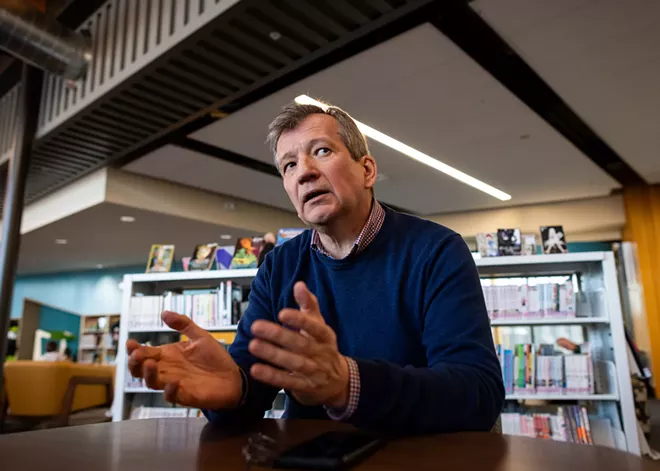They came for him on the day Russia invaded Ukraine.
It was Feb. 24, 2022, just after 9 pm. Arkadiy Paserba was eating dinner with his wife and two teenage children at their apartment in the Russian capital of Moscow when the doorbell rang. Three police officers stood in the hallway.
"I told them, 'Guys, could you join me? Let's take dinner together,'" Paserba says. "'What do you want in my house so late in the evening?'"
The police weren't there for dinner.
"We want you to go with us because we have some problems with your posts on Facebook," Paserba recalls the police saying.
Earlier that day, Russian tanks had rolled across the Ukrainian border, kickstarting what would become the largest attack on a European country since World War II. President Vladimir Putin appeared on Russian television downplaying the invasion as a "special military operation." But, Paserba, a longtime critic of Putin's regime, was unconvinced.
Paserba and his wife, Svetlana, had been attending rallies and speaking out against the government for years. In 2018, Paserba volunteered to work on the presidential campaign of Alexei Navalny, the Russian opposition leader whose suspicious death in a Russian prison camp last month sparked global protests and condemnation from numerous world leaders.
Paserba's political activity landed him in trouble before. He previously worked as an associate professor at the Plekhanov Russian University of Economics teaching information systems management. But in 2021, Paserba says his supervisor gave him a choice: Stop talking about politics during lectures or leave his job.
Paserba left the job.
Paserba was similarly defiant when the police came for him on the war's first night. He asked them to show paperwork and explain what charges he was being arrested under. He says they didn't have answers — just vague references to a Facebook post from a Russian political figure calling for protests that Paserba shared earlier that day.
The officers demanded that Paserba come with them voluntarily so his wife and children wouldn't have to see him taken away in handcuffs, Paserba says.
Paserba refused.
"What do you have against me?" he asked the police. "Do you have protocols? Orders for my arrest? Do you have decisions from the court?"
The officers repeated their demands, and the debate continued for some time.
"It was like a lecture for me," Paserba says.
Two more officers showed up — this time in full black tactical uniforms. As he continued to argue with the police, Paserba's blood pressure rose. He'd had a heart attack one year earlier.
His wife started to grow concerned and eventually called an ambulance. When medics showed up, they found that Paserba was having a heart arrhythmia episode and took him to the hospital. Police rode with him in the ambulance.
Paserba's political speech had made him a target of the Russian government. But he wasn't deterred.
On Feb. 28, 2022, as he recovered under watch of armed guards in the hospital, Paserba updated his Facebook profile picture to an image with a Ukrainian flag.
"Free Navalny!" the image read.
Paserba is recounting the story of his arrest during an interview at the Spokane Valley Library, where he and his wife have just finished getting help filing their first American tax returns.
"We like Spokane very much," Paserba says. "A little city in the far, far west."
Spokane has long been a hub for Russian-speaking people. There are more than a dozen Russian-language churches and several Slavic grocery stores. The Inland Northwest's climate is similar to Eastern Europe, and in the 1990s, thousands of Russian-speaking people fleeing religious persecution came to Spokane.
Russia's war in Ukraine prompted another wave of refugees. Since February 2022, more than 30,000 refugees have moved to Washington state. Mark Finney, the director of Spokane-based refugee housing nonprofit Thrive International, estimates that roughly 3,000 of them ended up in Spokane.
"It felt like home for the first few folks who came," Finney says. "When the war started, a lot of people had relatives or friends or acquaintances in this area that were their first point of connection to move here."
The war in Ukraine has also prompted large numbers of Russians to leave their country. In 2023, U.S. Customs and Border Protection encountered 57,000 Russians entering the U.S., compared with just 13,000 in 2021. Many cross at the U.S.-Mexico border.
The number of Russian refugees who have moved to Spokane since the war is harder to pin down, but it's still a significant number, Finney says. He estimates that Thrive has seen one Russian family for every 15 or 20 Ukrainian families.
Many of the Russians who have escaped to the U.S. are fleeing mandatory conscription. Others, like Paserba, are political refugees.
Before he started teaching at the university, Paserba spent 13 years in the Russian navy, working partly as a navigator on a submarine carrying nuclear warheads. His politics graudally changed, and he retired from the military in 1996.
"I became a pacifist," Paserba says. "Much more patient and much more humanistic."
In 2011, Russia was rocked by widespread allegations of corruption and election interference. Paserba and his wife became involved in the protests that broke out across the country, which some English language media began describing as the "Snow Revolution."
"I saw everything around us, and I could not sleep," Paserba says. "I would wake up at 4 am and begin to think about our future, our country, our children."
Navalny, the opposition leader who died last month, was a key figure in the protests. The lawyer and anti-corruption activist was credited for helping mobilize people through his blog posts.
Navalny ran for president during Russia's 2018 elections, and Paserba leapt at the opportunity to help. He volunteered at Navalny's campaign headquarters in Moscow and was later tasked with working as a representative monitoring the election process in the Russian region of Mordovia.
Navalny was eventually forced to suspend his campaign because of legal charges brought by the government, but Paserba stayed in Saransk, Mordovia's capital, and did election monitoring for a different opposition candidate.
Monitoring elections in Russia — where numerous international observers have reported widespread fraud — is a tall order. Paserba says an agent with the Federal Security Service, or FSB, accompanied him on election day and tried to pressure him into leaving before the polls closed.
"He told me: 'Arkadiy, do you want to go look at our new stadium? Do you want to have dinner with me? Do you want to go sightseeing in Saransk?'"
Paserba told the agent he would join him for sightseeing, but only after the polls closed at 8 pm.
"After 8 pm?" the agent replied. "What for?"
Putin won the election, defeating the other seven other candidates with an overwhelming 77% of the vote.
After being forced to suspend his campaign, Navalny continued his anti-corruption activism. He entered a coma in 2020 after a suspected poisoning by the FSB and was evacuated to Germany for treatment. He was quickly arrested upon his return to Russia.
In March 2022, Paserba spent a week at the Vinogradov hospital in Moscow, recovering from his heart ailment under the watch of police. He took photos of the bored-looking officers standing guard in their warm fur caps and recorded videos of himself arguing with his captors.
"What did I violate? What did I do?" Paserba says to an officer in one video, incensed.
Paserba was discharged that month, with orders to appear in front of a judge. He was given a court document that said the right to peaceful assembly may be subject to restrictions for the purpose of "preventing disorder or crime, for the protection of health or morals or for the protection of the rights and freedoms of other persons."
But Paserba says the protests that were the topic of his Facebook post were totally nonviolent and peaceful.
"I'm not an extremist, I'm not a terrorist," he says he told the judge. "I only wrote something on social media, it's not a dangerous activity."
The judge let Paserba off with a fine of 20,000 Russian rubles, or about $220 — the minimum penalty for promoting "non-sanctioned rallies" against the war.
That same month, Navalny was also facing the Russian legal system — this time on charges of embezzlement and contempt of court. A judge sentenced him to nine years in prison during a trial that the European Union and other international organizations condemned as politically motivated.
Paserba was lucky to escape with only a small fine, but he worried his family was in danger. He and his wife decided it was time to send their children out of the country.
They knew a couple in Spokane through mutual Facebook friends. They'd never actually met in person, but after a brief Skype session, Paserba decided to take the risk and send their children to stay with the Spokane couple.
Before he followed them, Paserba says police continued to sporadically show up at his Moscow apartment and warn him not to attend rallies.
"It was psychological pressure," Paserba says.
Paserba and his wife had a tourist visa from a previous trip to the United States that expired at the end of April. With the clock ticking, they decided that they, too, had to leave. The couple arrived in the U.S. on April 20 — a little over a week before the visa expired.
"It was the last train," Paserba says. "We escaped Russia. Forever."
Paserba still has family in Russia, but he isn't sure if or when he'll be able to return. "It's very dangerous for us," Paserba says.
Last year, Navalny was sentenced to an additional 19 years and transferred to a penal colony inside the Arctic Circle.
On Feb. 16, Russian authorities announced that Navalny, 47, had died after taking a walk and feeling unwell. Thousands of Russians turned out for his funeral in Moscow. World leaders were quick to blame Putin.
"He was really important," Paserba says. "I wasn't his close friend, but I saw him, he saw me."
Paserba's family is now applying for political asylum in the United States. They have an immigration hearing scheduled for next year. He continues to speak his mind about the Russian government and its war on Ukraine.
"Hundreds of thousands killed — what for?" Paserba says. "What is the reason? I don't understand it."
Paserba now works for the International Rescue Committee, helping refugees like himself get settled with housing and other resources. He says he continues to be surprised by how many programs and organizations exist here to help not just his family, but "all the people who are in some dramatic period of their life."
"There are people from all over the world," Paserba says. "Syria, Iraq, Afghanistan, Eritrea, Russia, Ukraine and all over Europe. Crowds of people are coming to Spokane." ♦
























